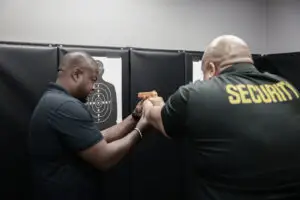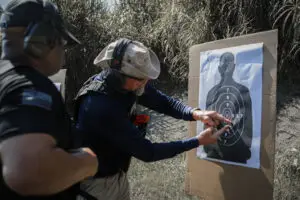Table of Contents
In today’s unpredictable world, concerns over personal safety and privacy have grown significantly. Whether it’s safeguarding high-profile individuals, protecting sensitive assets, or ensuring safety at major events, bodyguards and private security professionals play a vital role in creating a sense of security. This article explores the evolving world of private security, the challenges it faces, and the critical role it plays in modern life.
Part A – Understanding Bodyguards and Private Security

Private security encompasses a broad range of responsibilities, all aimed at ensuring safety and mitigating risks. While general security services often focus on property or event safety, bodyguards and private security professionals are tasked with providing tailored protection, often for individuals or high-value assets.
Key Responsibilities:
- Physical Protection: Safeguarding individuals from immediate harm or threats.
- Risk Assessment: Identifying vulnerabilities and devising strategies to minimize risks.
- Situational Awareness: Maintaining vigilance to detect and respond to potential threats before they escalate.
The role has evolved significantly over the years. What began as a straightforward focus on physical safety now includes strategic planning, advanced technological tools, and even intelligence gathering to prevent potential issues before they arise.
Part B – Types of Security Services

The scope of private security varies widely, with different types of services designed to address specific needs.
- Personal Protection: Bodyguards often provide security for individuals who face elevated risks due to their profession, public profile, or personal circumstances. These professionals work discreetly to ensure safety without intruding on daily activities.
- Event Security: Large gatherings, concerts, and high-profile events require specialized teams to manage crowd flow, handle access control, and respond to emergencies without disrupting the event’s ambiance.
- Residential and Asset Security: Protecting homes, valuables, or sensitive business assets requires a strategic approach, often involving surveillance, secure access systems, and on-site presence.
- Fire Watch and Safety Services: In scenarios where fire prevention systems are temporarily compromised, specialized fire watch teams ensure compliance with safety regulations and monitor for hazards.
Each type of service reflects the adaptability and range of skills required in private security, emphasizing its importance across diverse contexts.
Part C – Challenges in the Private Security Industry

Despite its critical role, private security faces several challenges, from public misconceptions to operational complexities.
- Public Perception: Private security professionals are often stereotyped as overbearing or unnecessarily aggressive. This perception overlooks the professionalism and strategic thinking required for the job.
- Training and Standards: A consistent challenge in the industry is ensuring that security personnel are adequately trained. High-stakes environments require professionals who are not only skilled but also equipped to handle situations with tact and discretion.
- Balancing Visibility and Discretion: Effective security means being present without disrupting the environment. This balance is especially critical for personal protection professionals who must navigate highly sensitive or public situations.
Part D – Elevating the Profession

As private security evolves, efforts to professionalize and elevate the industry are becoming more pronounced.
- Raising Industry Standards: The industry is seeing a shift toward greater accountability and ethics. High standards in reporting, training, and conduct help redefine the role of security personnel as trusted professionals.
- Comprehensive Training: Modern security roles demand training that goes beyond physical protection. Topics like conflict resolution, situational awareness, and advanced technology use are becoming standard components of training programs.
- Adapting to Client Needs: Private security is not one-size-fits-all. Each client, whether an individual, organization, or event, requires a tailored approach that respects their specific needs and vulnerabilities.
These advancements highlight the industry’s commitment to not only safeguarding lives and assets but also fostering a culture of respect, professionalism, and preparedness.
Part E – The Future of Private Security

The private security industry is poised for significant transformation, driven by technological innovation and evolving global trends.
- Emerging Technologies: Advancements like AI, predictive analytics, and real-time monitoring are changing how security is managed. These tools allow for proactive strategies, such as identifying risks before they materialize.
- Global Shifts in Demand: With the rise of high-profile events, remote working arrangements, and cybersecurity concerns, the need for specialized security services like executive protection and corporate security is growing.
- Empowering Security Personnel: The industry is also placing greater emphasis on empowering security professionals through continuous training, fair compensation, and recognition of their contributions. This shift not only improves service quality but also helps build respect for the profession.
Conclusion
Private security is more than a service—it’s a critical element of modern safety. As the world becomes increasingly complex, the role of bodyguards and private security professionals will continue to grow in importance. By prioritizing professionalism, adaptability, and innovation, the industry is redefining what it means to feel safe.
Whether it’s ensuring the smooth flow of a high-profile event, protecting a family’s home, or safeguarding a corporate leader, private security is about more than just responding to threats. It’s about creating peace of mind in an ever-changing world.
Quick Links
Resources
- Private Security
- Residential Security
- Corporate Events
- Retail & Loss Prevention
- Worksites & Warehouses
- Large Gatherings
- Health Providers & Clinics
- Hotels & Resorts
-
Cage#
8GY18 -
License#
B1900411 -
DUNS#
091352049


